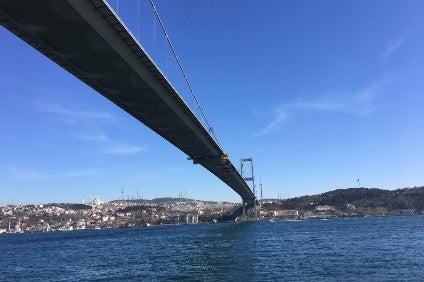
Turkey’s Investment Support and Promotion Agency says it is looking to showcase the country’s flagship auto sector, stressing its 600-year history with Europe and its long relationship with Western countries.
In terms of ranking, auto is by far Turkey’s largest manufacturing sector, employing around 300,000 people in both OEMs and suppliers, but recent political unrest coupled with the, now apparently calming, refugee situation, appears to have put some overseas companies off.

Discover B2B Marketing That Performs
Combine business intelligence and editorial excellence to reach engaged professionals across 36 leading media platforms.
The fact there are only nine – admittedly very large – OEMs in Turkey – albeit with hundreds of suppliers – is something of a mystery to those looking to bang the huge country’s drum – but the Promotion Agency is looking to highlight the advantages of investing.
Eastern and Central Europe are currently engaged in an arms race for labour, which has put pressure on wages, but Turkey’s significant 80m population rarely has such issues with a low average age rate.
“Turkey is not in lack of labour force, [the] average age is 30,” Investment Support and Promotion Agency of Turkey head of investment promotion services, Furkan Karayaka told just-auto in the organisation’s Istanbul headquarters.
“Even before those immigration issues Turkey was a young country. In our organisation automotive is one of the most important sectors – we have sectoral teams and automotive is a flagship for our agency. We want to show this picture to all the international automotive community.
“We have very good connections already with these countries in Turkey. We go to Japan for Toyota and France for Renault.”
One other potential attraction for foreign investors is Turkey is in the Customs Union with Brussels and although this arrangement is currently up for renegotiation, there is widespread feeling in the country its re-signing should be something of a formality.
Ankara has wanted to join the wider European Union (EU) for some time, but major political unrest two years ago culminating in a failed coup d’etat, appears to have scotched any chances of that for the time being.
“The Customs Union is being upgraded,” added Karayaka. “It is not even an issue – we are part of it. We are analysing investment into Turkey and more than 65% [comes] from the EU. Germany is the first country and trade partner. We are neighbours with these countries [EU] for 600 years and we are not going anywhere.”
Despite the automotive sector accounting for the largest slice of Turkish exports at US$28bn, no new OEM has come to the country for 18 years, which remains a source of frustration given the generous incentives on offer from Ankara to set up shop.
Some very high profile companies have evaluated Turkey, but it appears even more lucrative incentives have been offered by Central and Eastern countries, despite the real challenges of that region in attracting labour in sufficient number.
“Eastern Europe plays that card really well,” noted Karayaka. “Yes, we have one of the biggest populations in the region at 80m, but still it is not sufficient for them.
“There are more than 250 global suppliers using Turkey as a production base. We admit we should make more investments to make new industrial zones to increase other zones’ capability. What government does is [also] try to increase logistics capability.
“We [built] three very big bridges on the sea to connect Istanbul to the Marmara region. One of the biggest bridges has really decreased the time and cost for logistics.”
The need for easier logistics is clearly evident in the megalopolis of Istanbul, which is home to a quarter of that 80m population just on its own.
Quick and easy access to the gateway to Europe of Bulgaria is essential to take advantage of Customs Union imports to the EU and Turkey’s efforts in that regard can be seen in one of the gleaming new bridges speeding access to the West.






